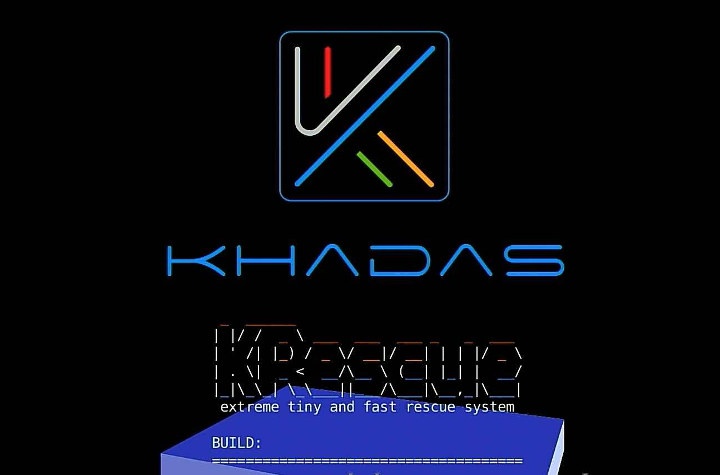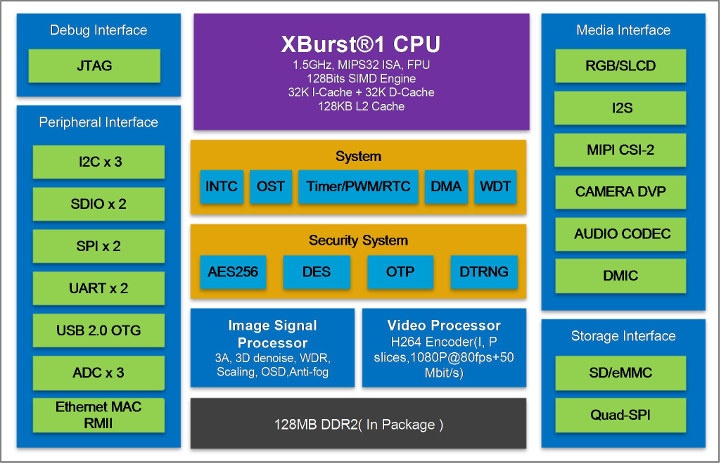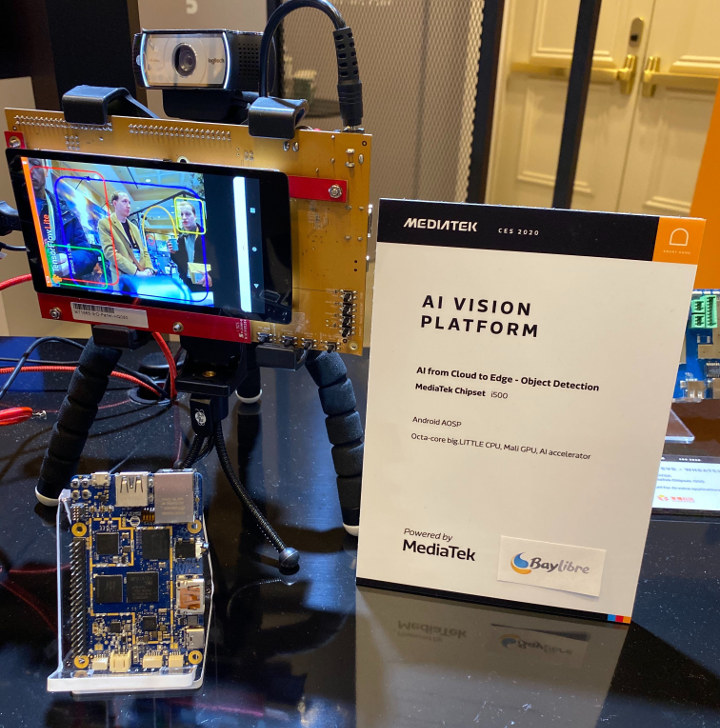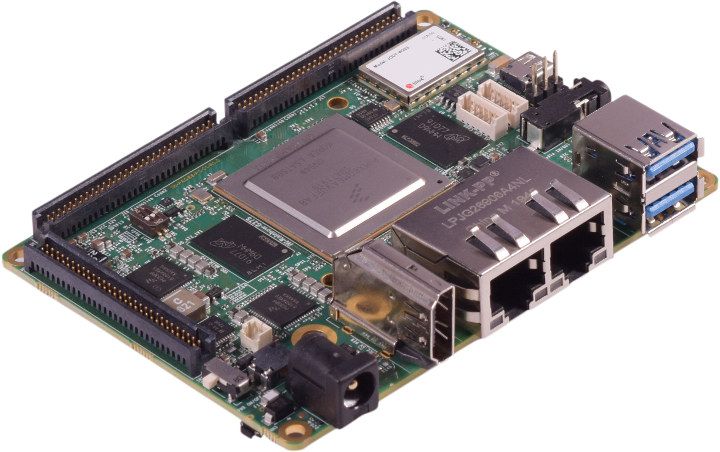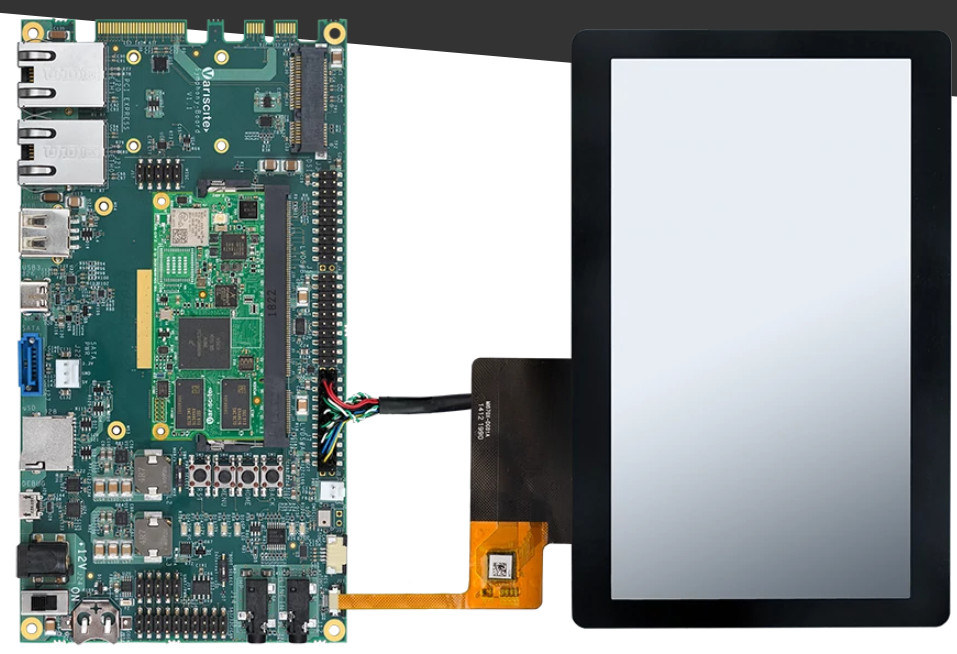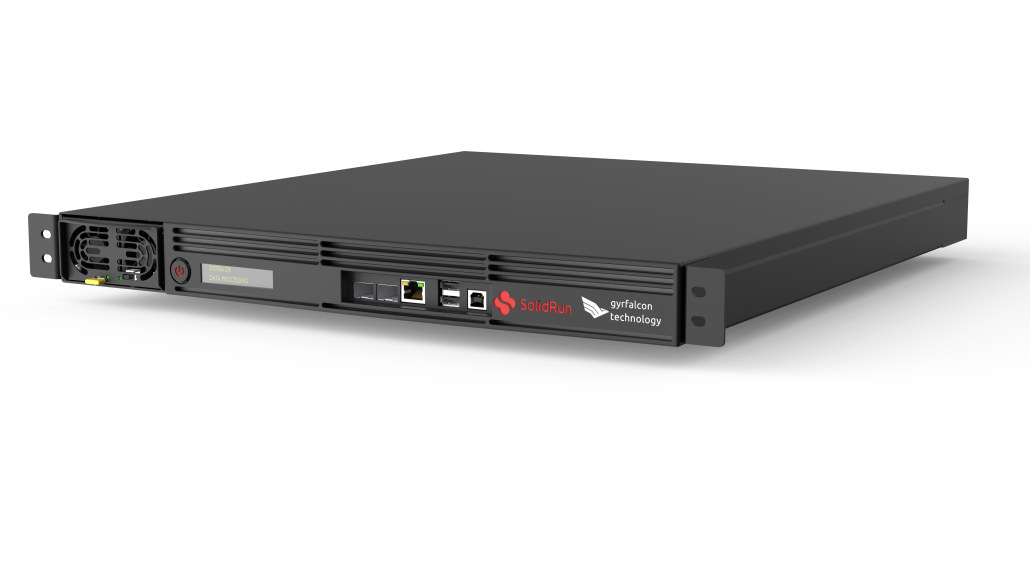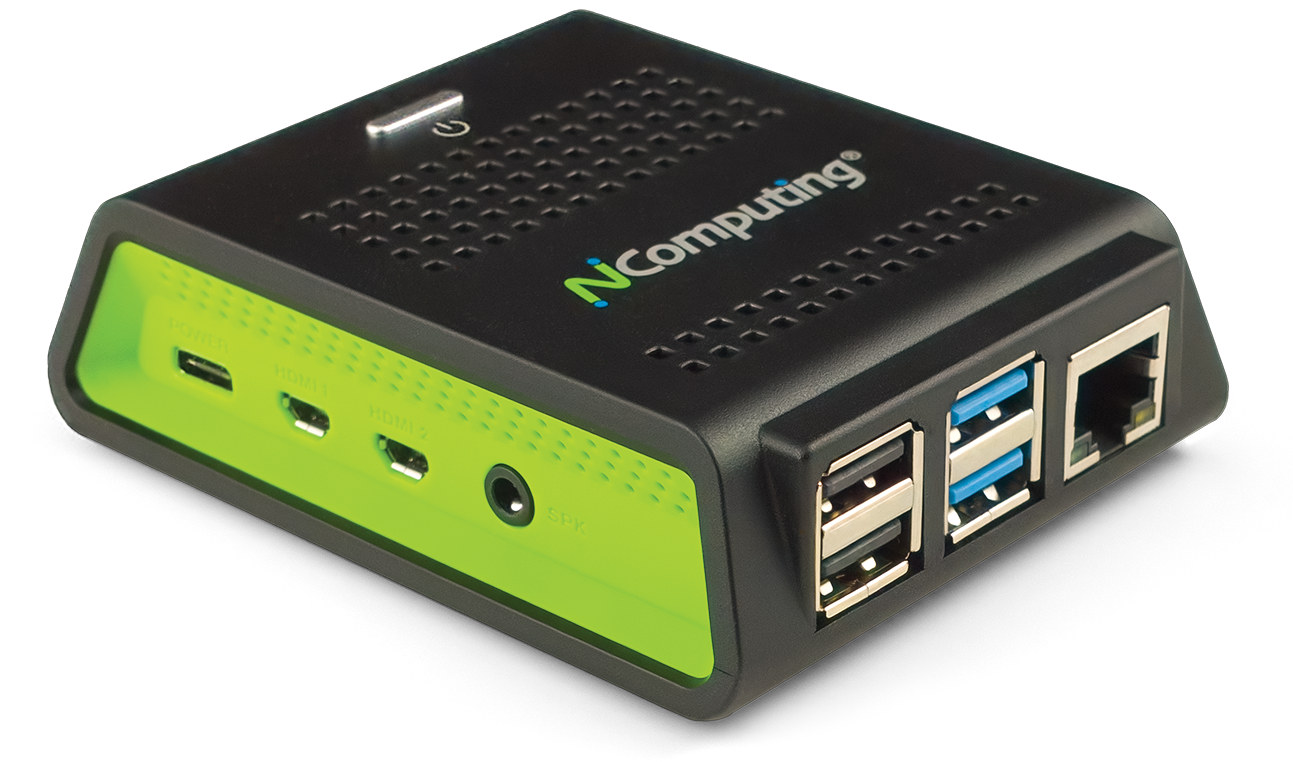Sometimes things go wrong, and you need a way to recover your system, either by restoring a backup or accessing your system to check it out and hopefully fix the issue. Krescue is a minimal firmware image (21MB compressed) for Khadas VIM boards designed to do just that, and more. Some of the highlights of Krescue firmware image include: Full eMMC flash dump/backup to Micro SD card, USB, or LAN host. Restore the compressed dump (.img.gz) into an eMMC on the same device or another device Rescue shell for expert users. Shell access via UART, USB network, and Web browser You’ll find Krescue for Khadas VIM1, VIM2, VIM3 and VIM3L on Khadas website which can be flashed to a MicroSD card using balenaEtcher. You can then insert the card into your board, and boot into maskROM mode to access the menu above, and control it with the IR remote control […]
Ingenic X1830 IoT Processor Features a 32-bit MIPS Core, 128MB DDR2 RAM
Ingenic is a silicon vendor based in Beijing, China and known for its MIPS Xburst processors such as JZ4780 dual-core SoC or T10 video processor. It’s been a while (a few years) since we last covered new processors from the company, but it appears the company launched another MIPS SoC for IoT applications last year. Meet Ingenic X1830 processor. X1830 specifications: CPU – MIPS32 XBurst-1 core @ up to 1.5 GHz with SIMD engine, 32KB instruction cache, 32KB data cache, 128KB unified L2 cache Memory – 128MB DDR2 in package Storage I/F – 2x SD/eMMC controllers, and Quad SPI (QSPI) VPU H264 Encoder up to 1080p80 or 1560×1600 resolution JPEG compressing/decompressing up to 70Mega-pixels per second ISP 12-bit RAW or up to 24-bit RGB Max input resolution 2688×2048 @20fps, 1080p @60fps,720p @120fps 2-D and 3-D noise reduction filter, advanced demosaic, color processing, lens shading, defog, glare, static/dynamic defect pixel… Image […]
MediaTek Rich IoT SDK v20.0 Released, Pumpkin i500 SBC Announced
MediaTek Rich IoT SDK v20.0 is Available MediaTek has announced its Rich IoT SDK v20.0 is already available for the i300 and i500 chipset series. The SDK was developed in collaboration with BayLibre, the French developer of Linux and Android embedded systems software, which is also known for helping mainlining Amlogic processors to Linux. The i300A, i300B, and i500 hardware platforms are supported and the features are focused on IoT and the emerging generation of smart devices. Supported OS’es and Test Applications The Rich IoT SDK v20.0 supports Yocto 3.0 Linux and Android 10 to let third-party customers and members of the MediaTek Ecosystem test Computer Vision algorithms, AI models and custom software on top of the base layer. Updates and Maintenance The SDK is receiving updates quarterly, with security updates and patches being delivered over-the-air (OTA) on a regular basis. The chipset series has a timeline for updates to […]
iWave Systems Launches NXP i.MX 8QuadMax / i.MX 8QuadPlus SBC
NXP i.MX 8 series family offers plenty of options from the i.MX 8X Cortex-A35 processor to i.MX 8QuadMax octa-core processor with two Arm Cortex-A72, four Arm Cortex-A53, and two Arm Cortex-M4F cores. We already covered plenty of i.MX 8 hardware on CNX Software, including a fair amount of i.MX 8QuadMax systems-on-module such as Toradex Apalis iMX8, iWave Systems iW-RainboW-G27M SMARC 2.0 SoM, Advantech ROM-7720 Qseven 2.1 computer-on-module, and others. But for some unknown reasons, there haven’t been that many i.MX 8QuadMax single board computer, and AFAICR we only wrote about Seco SBC-C43 board so far. But there’s now another option thanks to iWave Systems iW-Rainbow-G27S Pico-ITX SBC equipped with a choice of i.MX 8QuadMax or i.MX 8QuadPlus processor and up to 8GB RAM. iW-Rainbow-G27S specifications: SoC (one or the other)— NXP i.MX8 with VPU and HiFi4 DSP: NXP i.MX 8QuadMax with 2x Cortex-A72 cores, 4x Cortex-A53 cores, 2x Cortex-M4F real-time […]
Variscite Introduces i.MX 8M Mini and Nano SoM’s, Symphony Carrier Board
NXP i.MX 8M Mini and i.MX 8M Nano are lower cost and lower power variants of NXP i.M 8M processors manufactured using a 14nm FinFET process, and cutting some features such as HDMI and embedded DisplayPort, or hardware video decoder. NXP i.MX 8M Mini has been announced for over two years, so we’ve already written about many boards and systems-on-module (SoM) including Boardcon EM-IMX8M-MINI SBC, TechNexion XORE LGA SoM, or Congatec conga-SMX8-Mini SMARC 2.0 module among others. NXP i.MX 8M Nano is more recent, and we only covered a few announcements so far namely iWave Systems iW-RainboW-G34M-SM SoM and Conga-SMX8-Nano SMARC 2.0 computer-on-module. There’s now at least a third company working on a “Nano” module with Variscite announcing VAR-SOM-MX8M-NANO SoM together with a “Mini” version called VAR-SOM-MX8M-MINI, and Symphony carrier board and development kits. VAR-SOM-MX8M-MINI & VAR-SOM-MX8M-NANO Modules Both modules are part of Variscite VAR-SOM Pin2Pin family, and share the […]
SolidRun Janux GS31 Edge AI Server Combines NXP LX2160A & i.MX 8M SoCs with 128 Gyrfalcon AI Accelerators
AI inference used to happen exclusively in powerful servers hosted in the cloud, but in recent years great efforts have been made to move inference at the edge, usually meaning on-device, due to much lower latency, and improved privacy. On-device inference works, but obviously, performance is limited, and on battery-operated devices, one also has to consider power consumption. So for some applications, it makes sense to have a local server with much more processing power than devices, and lower latency than the cloud. That’s exactly the use case SolidRun Janux GS31 Edge AI inference server is trying to target using several NXP processors combined with up to 128 Gyrfalcon Lightspeeur SPR2803 AI accelerators Janux GS31 server specifications: CPU Module – CEx7 LX2160A COM Express module with NXP LX2160A 16-core Arm Cortex A72 processor @ 2.0 GHz System Memory – Up to 64GB DDR4 RAM via 2x SO-DIMM sockets “Video” Processors […]
Getting Started with Amlogic NPU on Khadas VIM3/VIM3L
Shenzhen Wesion released the NPU toolkit for Khadas VIM3/VIM3L last November, so I decided to try the latest Ubuntu 18.04 image and the NPU toolkit on Khadas VIM3L, before switching to VIM3 for reasons I’ll explain below. I’ve followed two tutorials from the forum and wiki to run pre-built samples and then building a firmware image and samples from source. Khadas VIM3L and VIM3 Have Different & Optional NPUs This will be obvious to anyone who read the specs for Khadas VIM3 and VIM3L that the former comes with a 5 TOPS NPU, while the one in the latter only delivers up to 1.2 TOPS. But somehow, I forgot about this, and assume both had the same NPU making VIM3L more attractive but this type of task, Obviously I was wrong. But the real reason I stopped using Khadas VIM3L can be seen in the photo below. My board is […]
NComputing RX420(HDX) Raspberry Pi 4 Thin Client Works with Citrix HDX
NComputing RX300 Raspberry Pi 3 thin client was launched in 2017 with support for the company’ vSpace Pro desktop virtualization solution for Linux and Windows, and I tested it accessing a Windows Server 2006 host located in Singapore, and performance was pretty good for a remote system as I could play 1080p YouTube videos, browse multiple tabs in Chrome, etc.. relatively smoothly. This type of solution is aimed at businesses, for which it may be easier and cheaper to handle a fleet of devices using thin clients and servers, instead of traditional PC’s. Beside its vSpace Pro RX300 thin client, NComputing also introduced another Raspberry Pi 3 thin client that same year with RX-HDX using a design similar to RX300 but instead integrating support for Citrix HDX virtualization technology. NComputing now unveiled an update for the latter with RX420(HDX) thin client based on Raspberry Pi 4 SBC with 2GB RAM. […]


